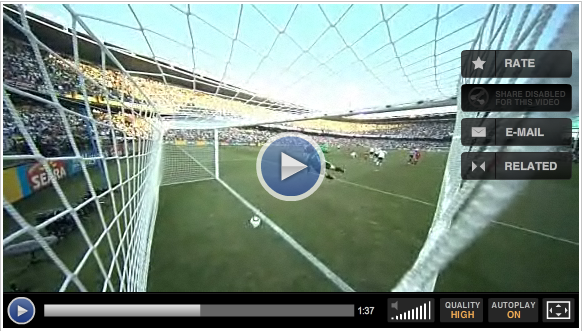If you were cheering or blowing your vuvuzela for a native English speaking team this world cup, odds are you believe the refs screwed you, your team, and your World Cup championship aspirations. Goals for both the American and UK players were withheld, while the ESPN and ABC commentators added their own razzle dazzle special effects to prove the validity of the goal and the terribly bad judgement/eye sight–or is it bias?–of the international referees trying their best to call a fair and balanced football match.
As a US-based spectator, my view of the referees and those specific calls (as well as the opinions of my immediate social circle) are all clouded. Technology is the culprit. It’s made me terribly easy to sway with facts, figures, statistics and even images and replays that the rest of the world (including the refs) are not privy to. In fact, I’d say the ESPN-loving, 24 hour sports new channel watching fans in the US are spoiled with technology.
Soccer is not our forte in the US. On a professional level it’s not nearly as popular as the big 4 (or perhaps even golf, Nascar or tennis for that matter). What is popular in every sport though, is the US flavor of augmented reality for sports. The graphical overlay, super-slo-mo in HD and other technology-intensive methods that help the general public digest what just happened in a sporting game. It may have been too fast for the ump, ref or official to notice, but the general public (through replay, coach’s challenge or booth review) becomes an embedded participant in athletic fairness moderated by technology.
Which is perhaps why we have so much trouble with FIFA and the World Cup play. That level of participation is simply not available. There’s no replay (except on our TV) and fairness is moderated by human fallibility manifested in the referees on the field rather than the technological aids provided to the “booth” or referees on the field. When a bad call ruins the day for a pitcher in the US, the ump apologizes and he hugs it out with the player he fouled. When it happens at the World Cup there’s little discourse. Instead it seems that the public takes to other technological channels (e.g. the ref’s Wikipedia page) to slay their opponent online while the game in question is altered in a significant, yet unknowable way. As spectators used to knowing the outcome unequivocally (technology doesn’t lie) we’re left sulking and thinking ‘if only’ we could fix the World Cup technologically and put these issues to rest. ESPN certainly doesn’t help with their coverage and augmented view through sports’ replay. While watching any of the Cup coverage just wait for them to acknowledge their technological superiority. As one ESPN Anchor said as they rotated the frozen image of German and English players on the field to better highlight the goal plane and the ball which had undoubtedly crossed it: “look at our technology”.
Should FIFA adopt goal line technology and the instant replay mentality of US-sports? Maybe. Or maybe they should maintain the human touch and human error that makes World Cup play so exciting. Who’s to say that the introduction of technology wouldn’t change things for the worse? After all, if the US goal had been allowed would Koman Coulibaly even have a page in Wikipedia?

